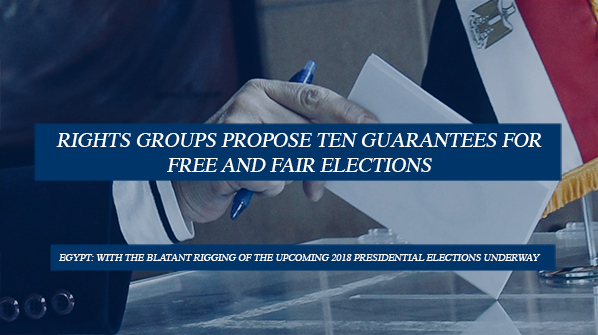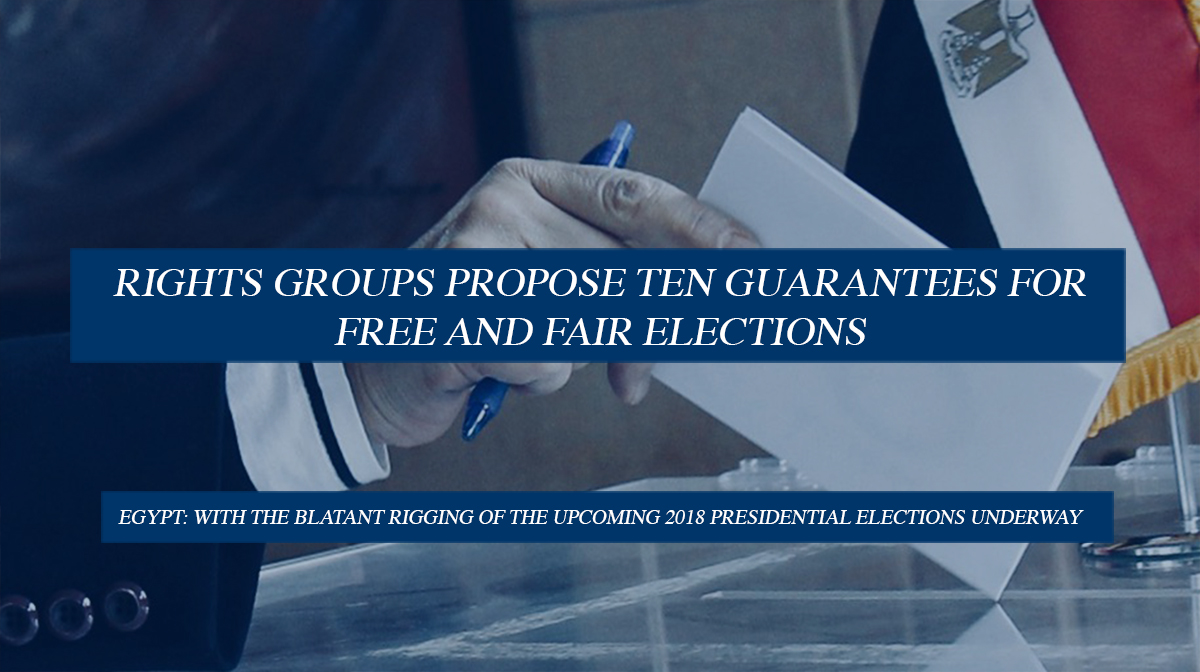
The undersigned organizations condemn the repressive and unjust actions taken against all individuals who have announced their intention to run in the presidential elections scheduled to begin in February 2018, and propose ten guarantees to ensure free and fair elections in Egypt. The current political and legislative context in Egypt lacks the minimum guarantees needed to conduct a free and fair election. If this context remains devoid of a set of guarantees and reforms to re-open the public sphere and facilitate competitive and fair elections that respect the Egyptian Constitution, the presidential elections will simply be a referendum to renew fealty to the sitting president. Ensuring the continuation of the current regime through a rigged referendum would smother the potential for a peaceful transfer of power while exacerbating political violence, terrorism, and political instability.
In this context, if the Egyptian government fails to respond to the election guarantees proposed in this statement, any international institution or organization participating in this preemptive misrepresentation of the voters’ will may be seen as offering its tacit approval. The current election rigging underway is based on years of repression against Egyptians as individuals and groups – through political, security, legislative, and judicial means- and the daily systematic erosion of the independence and competence of Egyptian state institutions.
Two weeks ago, state-run and allied media launched a smear campaign against former Prime Minister Ahmed Shafiq, accusing him of working for Turkey and Qatar and receiving backing from the Muslim Brotherhood. This came after Shafiq had declared his presidential candidacy and was deported from the UAE to Egypt, where he was placed under house arrest and compelled to withdraw his candidacy, in stark contradiction to statements made by him, his family, and his lawyer just hours earlier. Continuing the pressure and illegal practices, forces from the Interior Ministry arrested three of his alleged supporters at dawn on Wednesday, December 13. The same week, Col. Ahmed Qunsuwa, who had announced his intention to run for president on November 29, was interrogated by the Military Prosecution on charges of misconduct against the military regime. On Tuesday December 19th, he was sentenced to six years imprisonment. Lawyer Khaled Ali, who had announced his planned presidential candidacy in November of this year, awaits a second hearing on January 3 in the Doqqi Misdemeanor Appellate Court, which is considering his conviction and three-month prison sentence on fabricated charges of public indecency. If the sentence is upheld, it is likely that he will be excluded from the presidential race. Several of his supporters have also been arrested in the context of multiple raids between April and June 2017.
While all opposition candidates are faced with repression, intimidation, and obfuscation, the “So He Can Build It” campaign launched by supporters of the current President Abdel Fatah al-Sisi has enjoyed total freedom of action and intensive media coverage. Former MP Mohammed Anwar Sadat said in a statement that the authorities had obstructed a similar campaign launched by his supporters encouraging him to run for the presidency, and that the security authorities had suppressed the campaign with severe violence.
In the current political climate, the undersigned organizations fear that there is no indication of any political will to hold genuinely pluralist presidential elections. On the contrary, the stage is being set to reproduce the referendums for Mubarak prior to 2005, in which he was purportedly endorsed by 98% of the population. To avoid a recurrence of a rigged referendum masquerading as an election, the state must take several preliminary measures to institute basic guarantees prior to the vote, so that the next president may claim legitimacy through free, fair, and democratic elections respecting the will of the electorate. These guarantees are:
- Lift the undeclared house arrest of General Ahmed Shafiq and ensure his freedom to make the decision to resume his presidential campaign inside and outside of Egypt. Prior to this, enable independent rights organizations to visit and meet with him to determine the circumstances of his residence and the pressures to which he is being subjected, in addition to discontinuing all harassment of his supporters and members of his party.
- Stop using the judiciary to thwart potential presidential candidates, drop all politicized charges against them—including the charges against Khaled Ali—and ensure their full right to safely reach out to citizens at all stages of the electoral process on equal footing with the current president, including during the preparatory phase of collecting endorsements. Stop obstructing members of their electoral campaigns, their parties, and their supporters; including by releasing supporters of potential candidate Khaled Ali and dropping the charges and sentences issued against members of his Bread and Freedom party.
- Declare that all state institutions—including the military establishment to which the current president belongs—will remain neutral in regards to all candidates, without preference or antagonism.
- Immediately release and drop all politically–motivated charges against all peaceful political detainees, whether individuals or members of political parties, groups, or youth movements.
- Immediately release all journalists and photojournalists detained for reasons associated with their work, and stop penalizing journalists and writers; suspend policies designed to silence people and stop treating free, independent media as a crime.
- Unblock all news websites in Egypt and guarantee equal media opportunities in accordance with international standards for all candidates, especially equal to the current president, to ensure that the media – most of which is directly or indirectly allied with the regime – is not used for character assassination of competing candidates.
- Enable civil society organizations to play their oversight role in the presidential elections at all stages, by:
- Suspending enforcement of Law 70/2017 on civic associations, which undermines the effectiveness of civil society organizations and ensures their subordination to the state.
- Closing Case no. 173/2011, known as the “Foreign Funding Case” against international and independent Egyptian rights organizations, and annulling all associated politically-motivated legal actions and decrees, to permit international and Egyptian organizations to play their role in monitoring all stages of the electoral process and improving the capacities of teams working for this purpose.
- Cease enforcement of the Protest Law (no. 107/2013) and publish the repeal of the colonial-era Assembly Law (no.10/1914); the Assembly Law was unanimously repealed by the Egyptian Parliament 90 years ago. These two draconian laws allow the imprisonment of candidates and their supporters—with the exception of supporters of the current president—simply for meeting in groups of five or more persons. In addition, election rallies are subject to prior approval from the government, which is dominated by supporters of the current president.
- Immediately lift the state of emergency. At all stages prior to the vote, the state of emergency restricts the freedom of movement of all competing presidential candidates’ supporters, with the exception of the current president’s supporters. It should be noted that the state of emergency in force in Sinai since 2014 has only succeeded in exacerbating the hardship of its citizens, as well as political instability and violence.
- Freeze enforcement of all counterterrorism laws pending their amendment or repeal. These laws have proven inept in countering terrorism; and their primary apparent use is in retaliation against dissidents, persons of conscience, and supporters of competing candidates, as exemplified by the case of Christian citizen Andrew Nassef, a member of the Bread and Freedom Party whose founders are represented by Khaled Ali. Nassef was sentenced to five years in prison on charges of inciting terrorism.
In conclusion, the undersigned organizations affirm that competitive elections between multiple candidates is one of the most significant gains of the democratic movement in Egypt—a gain the current regime is attempting to undermine and turn into a quasi-referendum. The state has again reverted to manipulating the electoral process during the parliamentary elections, which resulted in a parliament representing the state apparatus rather than the people, much like the 2010 Parliament.
Signatures
- Cairo Institute for Human Rights Studies
- Arabic Network for Human Rights Information
- Egyptian Commission for Rights and Freedoms
- Andalus Institute for Tolerance and anti-Violence Studies
Share this Post

